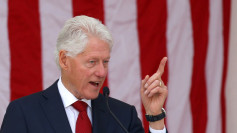The Philippines will grant the U.S. greater access to its military outposts, the two countries announced on Thursday.
The deployment gives U.S. military a stronger strategic foothold on the southeastern edge of the South China Sea, close to self-ruled Taiwan.
In recent months, the U.S. has increased its attempts to broaden its Indo-Pacific security options in response to growing worries about China's aggressive territorial posturing throughout the area.
During a visit to Manila on Thursday, U.S. Defense Secretary Llyod Austin stated that the U.S. and the Philippines remained committed to increasing their mutual capacity to resist armed attack.
"That's just part of our efforts to modernize our alliance. And these efforts are especially important as the People's Republic of China continues to advance its illegitimate claims in the West Philippine Sea," Austin said.
The recently announced agreement will allow the U.S. to rotate soldiers to a total of nine bases in the Philippines under an Enhanced Defense Cooperation Agreement (EDCA) that was signed in 2014.
Austin omitted to mention the bases' locations where the U.S. military will have new access.
Following the action, China issued a warning about rising tensions in the area. According to a spokesman for the Chinese foreign ministry, Mao Ning, the Philippines' permission for the U.S. to access four defense stations on its soil has "escalated tension in the region and endangers regional peace and stability."
"Out of its selfish agenda, the U.S. side has held up to the cold war. Regional countries should remain vigilant about this and avoid being used by the U.S.," Mao said.
The announcement on Thursday comes after a string of high-profile U.S. military agreements in the region, including plans to share defense technologies with India and to deploy new U.S. Marine units to Japanese islands.
Increased access to military facilities in the Philippines could put U.S. soldiers less than 200 miles south of Taiwan, the democratically administered 24-million-person island that the Chinese Communist Party claims as part of its sovereign territory despite never having controlled it.
The Biden administration has been unwavering in its support for the island as stipulated by the Taiwan Relations Act, under which Washington agrees to give Taiwan the means to defend itself without committing U.S. troops. Chinese leader Xi Jinping has refused to rule out the use of military force to bring Taiwan under Beijing's control.
Additionally, the U.S. Marine Corps built a new facility on Guam, a crucial U.S. territory east of the Philippines, last week. The area, called Camp Blaz, is the first brand-new Marine base in 70 years and will eventually house 5,000 Marines.






